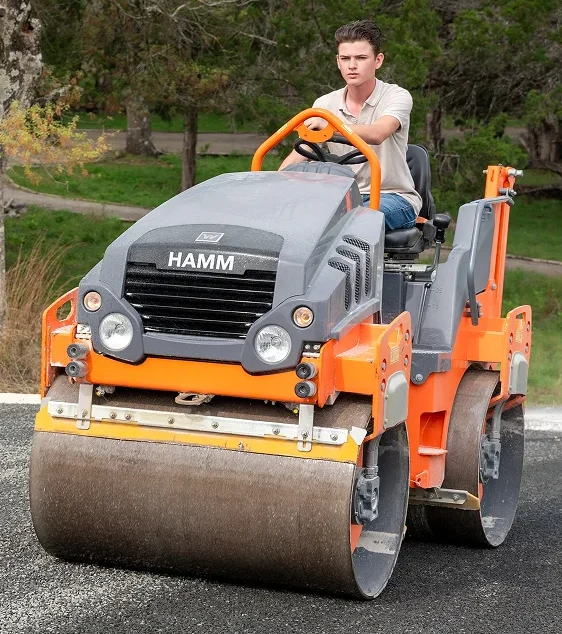Whether you’re planning to pave a new driveway, resurfacing a parking lot, or installing rural pavement in South Texas, the decision between asphalt vs concrete can significantly impact cost, durability, and long-term maintenance. While both materials are widely used for driveways and roads, they perform differently based on climate, budget, and project goals.
At C. Brooks Paving, we’ve helped homeowners and businesses across Bulverde and the Hill Country decide between asphalt and concrete for decades. From asphalt pavement repair to concrete driveway installation, we’ve done it all and we’re here to help you decide what’s best for your project.
This guide compares asphalt vs concrete driveway performance, costs, lifespan, installation process, and more so you can make an informed decision based on facts, not guesswork.
What Are Asphalt and Concrete?
Asphalt: The Flexible, Affordable Option
Asphalt is a black, sticky substance made from bitumen and aggregate. It’s commonly used for asphalt driveways, roads, and parking lots. Its key advantage lies in flexibility it expands and contracts, making it ideal in areas prone to freeze-thaw cycles or shifting ground.
Asphalt offers fast installation, lower upfront cost, and a smooth finish that’s easy to maintain with regular cleaning and reseal applications every three to five years.
Concrete: The Strong, Decorative Choice
Concrete driveway surfaces are made from a mixture of cement, water, sand, and stone that hardens over time. Concrete provides superior strength, excellent appearance options, and typically lasts longer than asphalt.
You can stamp, stain, or color the surface for aesthetics, making concrete a more sustainable and attractive option for residential driveway upgrades.
Asphalt vs Concrete: Factor-by-Factor Comparison
Here’s a detailed look at the differences between asphalt and concrete based on real-world experience in South Texas.
Installation Process & Time
Asphalt paving is quick usually ready in 2–3 days. The installation process involves heating, pouring, and compacting the asphalt surface while it’s hot.
Concrete takes longer about 7 days to cure. While concrete for your driveway is more time-consuming, it pays off with a longer lifespan and fewer repairs over time.
Cost Considerations: Per Square Foot
- Asphalt driveway: Lower upfront cost, usually $3–$6 per square foot.
- Concrete driveway: Higher upfront cost, ranging from $6–$10 per square foot.
Although asphalt is much cheaper to install, concrete generally performs better in terms of lifespan often exceeding 30 years with minimal repair.
Durability and Longevity
Durability and longevity matter, especially in cold climates or under heavy use.
- Asphalt lasts 15–25 years with proper repair and maintenance.
- Concrete can last 30–40 years if sealed and kept clean.
That said, asphalt requires resurface treatments and crack repair more often. However, asphalt is often easier and cheaper to fix.

Climate and Environmental Impact
Climate
- In colder climates, concrete may develop cracks due to freeze-thaw cycles.
- In hot regions like South Texas, asphalt tends to soften but can be repaired easily.
Environmental Impact
- Asphalt is one of the most recycled materials on Earth. Recycled asphalt is common in road construction.
- Concrete usually isn’t reused, but making concrete with eco-friendly materials is improving sustainability of asphalt and concrete surfaces alike.
Maintenance Needs and Cleaning
Asphalt
- Requires reseal every 3–5 years
- Easy to repair cracks, patch holes
- Lower repair cost
Concrete
- Needs less frequent cleaning
- Concrete may crack from roots or soil shifts
- Repair is more complex and visible
Proper cleaning, sealing, and maintenance are essential, no matter your surface.
Appearance: Which Driveway Is Best?
- Asphalt offers a uniform black look great for a sleek and clean finish.
- Concrete can be stamped, colored, or textured to suit any aesthetic ideal for curb appeal.
If you’re choosing between asphalt or concrete driveway for looks, concrete offers more visual options.
Best Use Cases: Choosing the Best Driveway
Residential Driveways
- Asphalt is ideal for budget-conscious homeowners or temporary solutions.
- Concrete suits those wanting a long-lasting, decorative finish.
Parking Lots and Commercial Areas
- Asphalt for your driveway or lot offers fast install, low cost, and easy repair.
- Use concrete only for light-use, premium spaces.
Rural Roads and Driveways
- Asphalt and concrete driveways in rural areas favor asphalt or chip seal for flexibility.
- Concrete works where machinery operates daily.
Comparing Asphalt and Concrete: Pros and Cons Table
| Feature | Asphalt | Concrete |
| Upfront Cost | Lower | Higher |
| Installation Time | 2–3 Days | ~7 Days |
| Lifespan | 15–25 Years | 30–40 Years |
| Repair | Easy and Low-Cost | Complex and Expensive |
| Appearance | Limited | Customizable |
| Heat Resistance | May Soften | Stays Cooler |
| Environmental Impact | Highly Recyclable | Less Recyclable |
| Maintenance | Frequent | Minimal |
Addressing the Driveway Debate: Common Misconceptions
- “Concrete driveways don’t need maintenance.”
Not true cleaning, sealing, and crack checks are still necessary. - “Asphalt isn’t durable.”
Actually, asphalt pavement holds up well if you stay on top of repair. - “Concrete is forever.”
Even new concrete can fail without drainage and proper installation.
Our Local Advice: Choosing Asphalt or Concrete
Every driveway surface has trade-offs. Here’s how to decide which is best:
- Choosing asphalt? It’s fast, affordable, and simple to repair.
- Going with concrete? Expect higher upfront cost, but much more durable results.
- For budget jobs? Use asphalt and plan for maintenance.
- For permanent upgrades? Invest in a concrete driveway and forget about frequent repair.
We tailor every solution at C. Brooks Paving to your property and budget.

Final Thoughts: Making the Right Driveway Decision
The driveway debate isn’t about finding the perfect material. It’s about finding the best choice for your site conditions, budget, and priorities.
- Asphalt offers speed, affordability, and repairability.
- Concrete shines in appearance and long-term value.
- If in doubt, ask a local expert especially in South Texas climate conditions.
At C. Brooks Paving, we don’t just pave. We guide you through every step of the installation, repair, and maintenance process to make sure your surface lasts.
FAQs
Q: 1 What’s better for a hot climate concrete or asphalt?
A: Concrete tends to stay cooler. Asphalt may soften but is easier to repair.
Q: 2 Which cracks more concrete or asphalt?
A: Concrete may crack from movement. Asphalt resists minor shifts but needs resurface more often.
Q: 3 Can I go from asphalt to concrete?
A: Yes but expect full removal of the old asphalt and a higher upfront cost.
Q: 4 Which material is greener?
A: Asphalt is more recyclable. Concrete has eco-versions, but the process is more involved.





